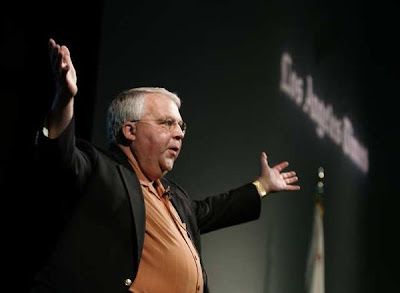The Washington Post
Here's a sneak peak of what you can expect from your national Wednesday NFL open locker room coverage: defensive players complaining loudly and eloquently about the league's sudden emphasis on preventing concussions. You will see stories like this from just about every NFL market, with players arguing that a certain level of violence is inevitable, and that legislating it out through fines and/or suspensions is both hypocritical and impossible.
For your sneak peak, I present Phillip Daniels's Tuesday appearance on the LaVar and Dukes show. Daniels actually began his critique of the NFL on Twitter; some of his comments are grouped together here:
Have we become a cupcake league? We already have better helmets and gear. Wonder how the old school players feel about this. Not in the back of minds when talking about 18 game season so let's play football please....Even guys using shoulders to hit are getting flagged for helmet-to-helmet. Defense is getting sloppy because guys are avoiding fines and will get worse if suspending comes into play....
There has been a warning sticker on the back of every helmet since pee wee league. When u put that helmet on you know you will hit or be hit. We still choose to play. Parents are asked to sign forms for their kids to play because of the dangers of the sport. Nothing is different.
On the radio, he was perhaps even more pointed when asked about the NFL's response to last week's carnage.
"To me, when I hear guys getting fined that much money for a game in which we're taught to be physical and hit people, I think it's ridiculous," Daniels said. "When this game started, from way back, your dream is to go out there and hit somebody and bring some excitement to the game. You're talking about taking that away. Guys are gonna get hurt. This is football. This ain't no cupcake league.You're gonna go out and play football, you're gonna get hit. Offensive players know they're gonna get hit, and defensive players go out to hit. Nothing's changed. You just go out there and play football and take all this other stuff out of it, this suspension stuff. It's kind of crazy. The fines are crazy too."
Daniels echoed a widespread opinion that the double knockout shot leveled by Dunta Robinson on DeSean Jackson was actually clean, and he said that players are virtually never trying to hurt each other.
"I don't think guys should just go be blatant and go after a head or leave their feet and spear somebody with a helmet, but we're taught to be physical, we're taught to go out and hit people," he said. "And now you get a couple of stars hurt in this league, now they want to talk about suspending guys? I just think this game is going downhill. Defenses right now are sloppy, there's more missed tackles, because guys are trying to avoid the helmet-to-helmet hit. Now you're talking about suspending guys? You definitely gonna get a lot of guys trying to go in the wrong way, missing tackles....You've just got to go out and play football."
Daniels said he uses an "old-school" helmet and is suspicious of the new helmet technology, saying that all three Redskins who have suffered concussions this season were using newer models. He said he's never been on a team that suffered as many concussions as these Redskins, who have already lost Chris Cooley, Rocky McIntosh and Anthony Bryant to head injuries. But he also said that when you go into his profession, you do so with the understanding that your body might be damaged.
"They've done a lot to make this league safer," he said. "It's changed a whole lot already. We protected the quarterback, you've got the horse collar [rule] that happened when T.O. went down. A superstar goes down, the rules change, that's just how it is. I don't get it. We get a couple big name guys go down this weekend, now we're talking about the helmet issue. I just think the NFL, they've done a lot to keep players safe.
"You're gonna get hurt, and if people ever wonder why we get paid so much, this is why. They're talking about this helmet-to-helmet stuff, but it's not coming into play when they're talking about 18 games....How can they argue the 18 game increase? It's crazy. This game is already tough enough with 16 games. To add two more, as physical as this game is, is kind of ridiculous."




















